八大时态简易练习讲解学习
初中八种英语时态精讲精练(含答案)
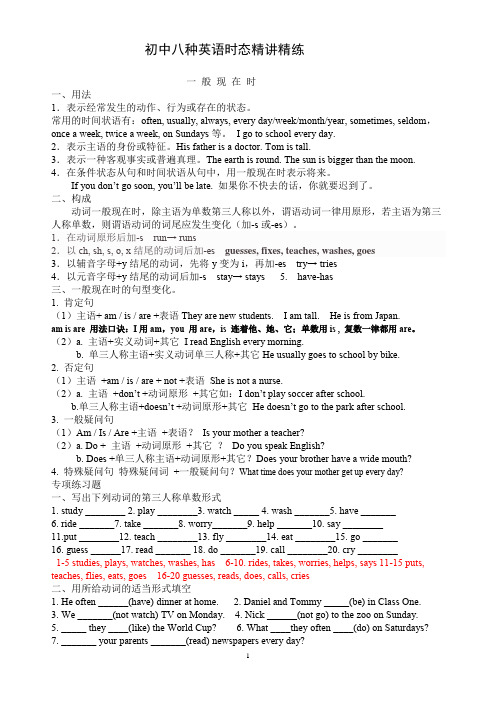
初中八种英语时态精讲精练一般现在时一、用法1.表示经常发生的动作、行为或存在的状态。
常用的时间状语有:often, usually, always, every day/week/month/year, sometimes, seldom,once a week, twice a week, on Sundays等。
I go to school every day.2.表示主语的身份或特征。
His father is a doctor. Tom is tall.3.表示一种客观事实或普遍真理。
The earth is round. The sun is bigger than the moon. 4.在条件状态从句和时间状语从句中,用一般现在时表示将来。
If you don’t go soon, you’ll be late. 如果你不快去的话,你就要迟到了。
二、构成动词一般现在时,除主语为单数第三人称以外,谓语动词一律用原形,若主语为第三人称单数,则谓语动词的词尾应发生变化(加-s或-es)。
1.在动词原形后加-s run→ runs2.以ch, sh, s, o, x结尾的动词后加-es guesses, fixes, teaches, washes, goes3.以辅音字母+y结尾的动词,先将y变为i,再加-es try→ tries4.以元音字母+y结尾的动词后加-s stay→ stays 5. have-has三、一般现在时的句型变化。
1. 肯定句(1)主语+ am / is / are +表语They are new students. I am tall. He is from Japan.am is are 用法口诀:I用am,you 用are,is 连着他、她、它;单数用is , 复数一律都用are。
(2)a. 主语+实义动词+其它I read English every morning.b. 单三人称主语+实义动词单三人称+其它He usually goes to school by bike.2. 否定句(1)主语+am / is / are + not +表语She is not a nurse.(2)a. 主语+don’t +动词原形+其它如:I don’t pla y soccer after school.b.单三人称主语+doesn’t +动词原形+其它He doesn’t go to the park after school.3. 一般疑问句(1)Am / Is / Are +主语+表语?Is your mother a teacher?(2)a. Do + 主语+动词原形+其它?Do you speak English?b. Does +单三人称主语+动词原形+其它?Does your brother have a wide mouth?4. 特殊疑问句特殊疑问词+一般疑问句?What time does your mother get up every day?专项练习题一、写出下列动词的第三人称单数形式1. study ________2. play ________3. watch _____4. wash _______5. have _______6. ride _______7. take _______8. worry_______9. help _______10. say ________11.put ________12. teach ________13. fly ________14. eat ________15. go _______16. guess ______17. read _______ 18. do _______19. call ________20. cry ________1-5 studies, plays, watches, washes, has 6-10. rides, takes, worries, helps, says 11-15 puts, teaches, flies, eats, goes 16-20 guesses, reads, does, calls, cries二、用所给动词的适当形式填空1. He often ______(have) dinner at home.2. Daniel and Tommy _____(be) in Class One.3. We _______(not watch) TV on Monday.4. Nick ______(not go) to the zoo on Sunday.5. _____ they ____(like) the World Cup?6. What ____they often ____(do) on Saturdays?7. _______ your parents _______(read) newspapers every day?8. The girl _______(teach) us English on Sundays.9. She and I ________(take) a walk together every evening.10. The moon ________ (travel) round the earth.11. It usually ________ (take) me more than two hours to finish my homework.12. I will tell him the good news as soon as he ________ (come) back.13. Miss Gao is very busy. She ________ (sleep) six hours a day.14. Look! Susan ________ (dance) in the garden. She often ________ (dance) there.15. The children will go to the Summer Palace if it ________ (not rain) tomorrow.16. I _________ any pears (not have). But Mary _________ some (have).17. What language ____ you _____? (speak) 18. My brother _____ to be a scientist. (not like) 19. We ______ Japanese at school. (not study) 20. He _____ playing football. (not like)1. has2. are3. don’t have4. doesn’t go5. Do like6. do, do7. Do, read8. teaches9. take 10. travels 11. takes 12. comes 13. sleeps 14. is dancing, dances 15. doesn’t rain 16. don’t have, has 17. do, speak 18. doesn’t like 19. don’t study 20. doesn’t like三、按照要求改写句子1. Daniel watches TV every evening.(改为否定句)_________________________2. I do my homework every day.(改为一般疑问句,并作肯、否定回答)________________________________________________________3. Amy likes playing computer games.(改为一般疑问句,并作肯、否定回答)___________________________________________________4. We go to school every morning.(改为否定句)____________________________5. Sun Yang usually washes some clothes on Saturday.否定句: _____________ 一般疑问句: ________________ 划线提问: ____________6. Tom does his homework at home.否定句: ______________ 一般疑问句: ____________ 划线提问_____________1. Daniel doesn’t watch TV every evening.2. Do you do your homework every day? Yes, I do. No, I don’t.3. Does Amy like playing computer games? Yes, she does. No, she doesn’t.4. We don’t go to school every morning.5. Sun Yang doesn’t usually wash any clothes on Saturday. Does Sun Yang usually wash any clothes on Saturday? What does Sun Yang usually do on Saturday?6. Tom doesn’t do his homework at home. Does Tom do his homework at home? Where does Tom do his homework?四、选用所给的词语适当形式填空give, rain, enjoy, sing, return, borrow, keep1. It often ______ in my hometown in summer.2. Sometimes the birds _______ in the tree.3. Joe usually ____ books from the school library, but she never _____ them on time.4. May I ________ the dictionary for a week?5. The little boy ________ himself in the garden on Saturdays.6. Mary is a good girl. She often ________ me a hand when I need some help.1. rains2. sing3. borrows, returns4. keep5. enjoys6. gives一般过去时的用法一、定义:表示过去某一时间所发生的动作或存在的状态;表示在过去一段时间内,经常性或习惯性的动作。
初中英语八种时态及被动语态的讲解与练习
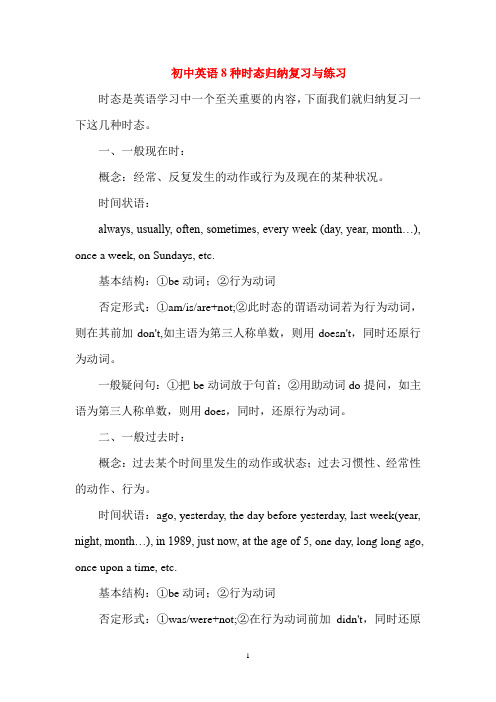
初中英语8种时态归纳复习与练习时态是英语学习中一个至关重要的内容,下面我们就归纳复习一下这几种时态。
一、一般现在时:概念:经常、反复发生的动作或行为及现在的某种状况。
时间状语:always, usually, often, sometimes, every week (day, year, month…), once a week, on Sundays, etc.基本结构:①be动词;②行为动词否定形式:①am/is/are+not;②此时态的谓语动词若为行为动词,则在其前加don't,如主语为第三人称单数,则用doesn't,同时还原行为动词。
一般疑问句:①把be动词放于句首;②用助动词do提问,如主语为第三人称单数,则用does,同时,还原行为动词。
二、一般过去时:概念:过去某个时间里发生的动作或状态;过去习惯性、经常性的动作、行为。
时间状语:ago, yesterday, the day before yesterday, last week(year, night, month…), in 1989, just now, at the age of 5, one day, long long ago, once upon a time, etc.基本结构:①be动词;②行为动词否定形式:①was/were+not;②在行为动词前加didn't,同时还原行为动词。
一般疑问句:①was或were放于句首;②用助动词do的过去式did 提问,同时还原行为动词。
三、现在进行时:概念:表示现阶段或说话时正在进行的动作及行为。
时间状语:now, at this time, these days, etc.基本结构:am/is/are+doing否定形式:am/is/are+not+doing.一般疑问句:把be动词放于句首。
四、过去进行时:概念:表示过去某段时间或某一时刻正在发生或进行的行为或动作。
英语常用八种基础时态讲解和练习

英语常用八种基础时态讲解和练习LEKIBM standardization office【IBM5AB- LEKIBMK08- LEKIBM2C】英语时态一般现在时一般现在时通常用动词原形表示,但当主语是第三人称单数(he, she, it, Tom)时需要在在动词原形后面加-e或-es.如:一般现在时的基本用法1.表示主语现在的特征和状态,通常不用时间状语。
He is twelve, she is at home. She likes bread.2. 表示经常发生、反复发生的动作。
这种用法中与always, usually, often, sometimes, hardly ever, never, once a week等频度副词连用。
She often goes to the movies on weekends.--When is your birthday?--My birthday is January 15th.3.表示客观真理、科学事实、格言等。
The sun always rises in the east.太阳总是从东方升起。
The teacher said that the earth goes around the sun.4.一般现在表示将来时。
①. 表示按时间表拟定的或安排好,到时就发生的事情或动作。
The train arrives at 10:30. There is plenty of time.火车十点三十分到达,还有充足的时间。
She comes back next week.她下周会回来。
②在时间状语从句和条件状语从句中。
I will discuss this with you when we meet next time.下次见面时咱们再讨论。
If he arrives, please give me a phone call.现在进行时构成:be(am, is are)+现在分词。
英语8种时态讲解及练习精编版

英语时态八种基本时态讲解及练习一.概念:英语中表示不同时间发生的动作或存在的状态,需用不同的动词形式表示,这种不同的动词形式称为时态。
二.种类:(基本时态)一般现在时一般过去时现在进行时过去进行时一般将来时过去将来时现在完成时过去完成时三.用法:1)一般现在时表示经常发生或习惯性的动作或状态及客观现实和普遍真理。
一般现在时常以动词原形表示,但当主语是第三人称单数时,动词词尾加-s或-es。
2)句型结构:主语+V.(包括be动词)+宾语+…She is an engineer.He has breakfast at 6:00every day.3)注意:a)一般现在时通常与always , often , usually , every day , sometimes , once a week等时间状语连用。
I always watch TV at 8: 00 in the evening .They go home once a week .We usually do our homework at home .b)表客观现实或普遍真理。
The sun always rises in the east .The light travels faster than the sound .c)表永远性的动作或状态。
He lives in the country .4)第三人称单数变化形式。
a)一般情况动词在词尾加-s .come---comes speak---speaks work---works live---lives b)以o, s, x, ch, sh结尾的单词在词后加-es.do---does go---goes finish---finishes brush---brushes fix---fixes pass---passes watch---watchesc)以“辅音字母+y”结尾的单词变y为i加-es.Study---studies carry-carries cry---criesd)以“元音字母+y”结尾的单词直接加-s.play---plays stay---stays例句:我们每天晚上九点做作业。
初中英语语法-八种时态详解与练习
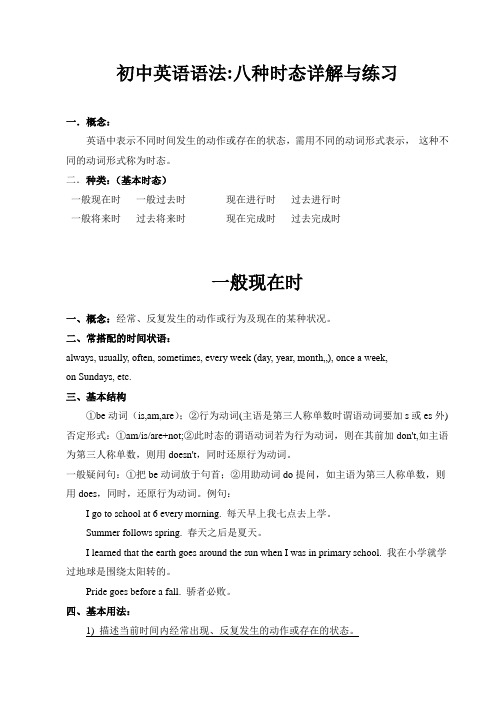
初中英语语法:八种时态详解与练习一.概念:英语中表示不同时间发生的动作或存在的状态,需用不同的动词形式表示,这种不同的动词形式称为时态。
二.种类:(基本时态)一般现在时一般过去时现在进行时过去进行时一般将来时过去将来时现在完成时过去完成时一般现在时一、概念:经常、反复发生的动作或行为及现在的某种状况。
二、常搭配的时间状语:always, usually, often, sometimes, every week (day, year, month…), once a week,on Sundays, etc.三、基本结构①be动词(is,am,are);②行为动词(主语是第三人称单数时谓语动词要加s或es外) 否定形式:①am/is/are+not;②此时态的谓语动词若为行为动词,则在其前加don't,如主语为第三人称单数,则用doesn't,同时还原行为动词。
一般疑问句:①把be动词放于句首;②用助动词do提问,如主语为第三人称单数,则用does,同时,还原行为动词。
例句:I go to school at 6 every morning. 每天早上我七点去上学。
Summer follows spring. 春天之后是夏天。
I learned that the earth goes around the sun when I was in primary school. 我在小学就学过地球是围绕太阳转的。
Pride goes before a fall. 骄者必败。
四、基本用法:1) 描述当前时间内经常出现、反复发生的动作或存在的状态。
在这种情景中,句子常带有表示频率的时间状语:always , everyday , often , once a week (month , year , etc.) , sometimes , seldom , usually等等,以表示句中的动作或状态是习惯性的、经常性的。
初中英语八大时态讲解及练习(全)

一、一般现在时:令狐采学概念:经常、反复发生的动作或行为及现在的某种状况。
时间状语:always, usually, often, sometimes, every week (day, year, month…), once a week, on Sundays, etc.基本结构:①be动词;②行为动词否定形式:①am/is/are+not;②此时态的谓语动词若为行为动词,则在其前加don't,如主语为第三人称单数,则用doesn't,同时还原行为动词。
一般疑问句:①把be动词放于句首;②用助动词do提问,如主语为第三人称单数,则用does,同时,还原行为动词。
在一般现在时中,当主语是第三人称单数时,谓语动词要用第三人称单数形式,即常在动词原形后加-s或-es。
一、人称代词he, she, it是第三人称单数。
如:He likes watching TV. 他喜欢看电视。
She has lunch at twelve. 她十二点吃午餐。
It looks like a cat. 它看起来像只猫。
(口诀:I用am,you用are,is用于她他它,单数名词用is,复数名词都用are)二、单个人名、地名或称呼作主语;是第三人称单数。
如:①Han Mei looks like her mother. 韩梅看起来像她的母亲。
②Beijing is in China. 北京在中国。
③Uncle Wang ofte n makes cakes. 王叔叔经常做蛋糕。
三、单数可数名词或"this / that / the+单数可数名词"作主语时,是第三人称单数。
如:①A horse is a useful animal. 马是有用的动物。
②This book is yours. 这本书是你的。
四、不定代词someone, somebody, nobody, everything, something 等及指示代词this, that作主语时,是第三人称单数。
初中英语语法八大时态总结及练习题
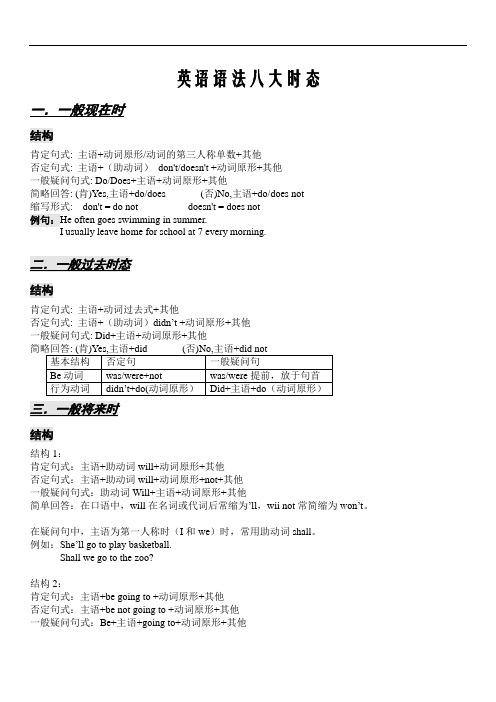
英语语法八大时态一.一般现在时结构肯定句式: 主语+动词原形/动词的第三人称单数+其他否定句式: 主语+(助动词)don't/doesn't +动词原形+其他一般疑问句式: Do/Does+主语+动词原形+其他简略回答: (肯)Yes,主语+do/does (否)No,主语+do/does not缩写形式: don't = do not doesn't = does not例句:He often goes swimming in summer.I usually leave home for school at 7 every morning.二.一般过去时态结构肯定句式: 主语+动词过去式+其他否定句式: 主语+(助动词)didn’t +动词原形+其他一般疑问句式: Did+主语+动词原形+其他基本结构否定句一般疑问句Be动词was/were+not was/were提前,放于句首行为动词didn’t+do(动词原形)Did+主语+do(动词原形)三.一般将来时结构结构1:肯定句式:主语+助动词will+动词原形+其他否定句式:主语+助动词will+动词原形+not+其他一般疑问句式:助动词Will+主语+动词原形+其他简单回答:在口语中,will在名词或代词后常缩为’ll,wii not常简缩为won’t。
在疑问句中,主语为第一人称时(I和we)时,常用助动词shall。
例如:She’ll go to play basketball.Shall we go to the zoo?结构2:肯定句式:主语+be going to +动词原形+其他否定句式:主语+be not going to +动词原形+其他一般疑问句式:Be+主语+going to+动词原形+其他简略回答:(肯)Yes,主语+be (否)No,主语+be not将来时其他表示法1)be going to表示将来表示说话人的打算、计划、安排或根据迹象判断必然或很可能发生的事情。
cljhnAAA初中英语八大时态讲解及练习(全)

c l j h n A A A初中英语八大时态讲解及练习(全)-CAL-FENGHAI.-(YICAI)-Company One1一、一般现在时:概念:经常、反复发生的动作或行为及现在的某种状况。
时间状语:always, usually, often, sometimes, every week (day, year, month…), once a week, on Sundays, etc.基本结构:①be动词;②行为动词否定形式:①am/is/are+not;②此时态的谓语动词若为行为动词,则在其前加don't,如主语为第三人称单数,则用doesn't,同时还原行为动词。
一般疑问句:①把be动词放于句首;②用助动词do提问,如主语为第三人称单数,则用does,同时,还原行为动词。
在一般现在时中,当主语是第三人称单数时,谓语动词要用第三人称单数形式,即常在动词原形后加-s或-es。
一、人称代词he, she, it是第三人称单数。
如:He likes watching TV. 他喜欢看电视。
She has lunch at twelve. 她十二点吃午餐。
It looks like a cat. 它看起来像只猫。
(口诀:I用am,you用are,is用于她他它,单数名词用is,复数名词都用are)二、单个人名、地名或称呼作主语;是第三人称单数。
如:①Han Mei looks like her mother. 韩梅看起来像她的母亲。
②Beijing is in China. 北京在中国。
③Uncle Wang often makes cakes. 王叔叔经常做蛋糕。
三、单数可数名词或"this / that / the+单数可数名词"作主语时,是第三人称单数。
如:①A horse is a useful animal. 马是有用的动物。
②This book is yours. 这本书是你的。
初中英语八大时态全套精讲及练习题(附答案)
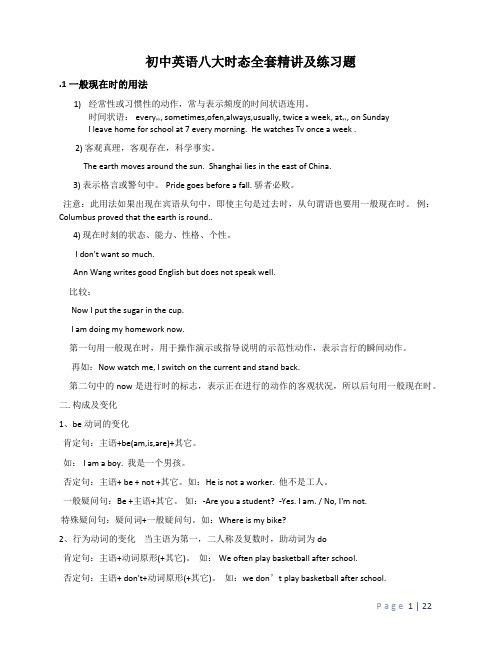
初中英语八大时态全套精讲及练习题.1 一般现在时的用法1)经常性或习惯性的动作,常与表示频度的时间状语连用。
时间状语: every…, sometimes,ofen,always,usually, twice a week, at…, on SundayI leave home for school at 7 every morning. He watches Tv once a week .2) 客观真理,客观存在,科学事实。
The earth moves around the sun. Shanghai lies in the east of China.3) 表示格言或警句中。
Pride goes before a fall. 骄者必败。
注意:此用法如果出现在宾语从句中,即使主句是过去时,从句谓语也要用一般现在时。
例:Columbus proved that the earth is round..4) 现在时刻的状态、能力、性格、个性。
I don't want so much.Ann Wang writes good English but does not speak well.比较:Now I put the sugar in the cup.I am doing my homework now.第一句用一般现在时,用于操作演示或指导说明的示范性动作,表示言行的瞬间动作。
再如:Now watch me, I switch on the current and stand back.第二句中的now是进行时的标志,表示正在进行的动作的客观状况,所以后句用一般现在时。
二. 构成及变化1、be动词的变化肯定句:主语+be(am,is,are)+其它。
如: I am a boy. 我是一个男孩。
否定句:主语+ be + not +其它。
如:He is not a worker. 他不是工人。
初中八种基本时态讲解及练习
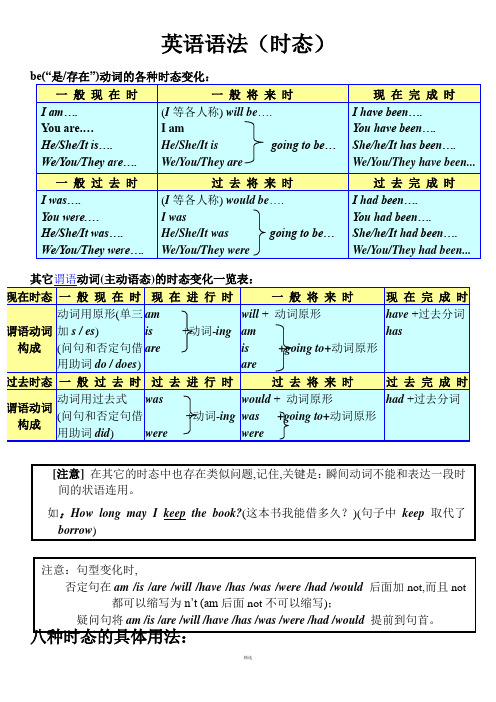
英语语法(时态)注意:句型变化时,否定句在am /is /are /will /have /has /was /were /had /would 后面加not,而且not 都可以缩写为n’t (am后面not不可以缩写);疑问句将am /is /are /will /have /has /was /were /had /would 提前到句首。
八种时态的具体用法:(1)一般现在时:表示现阶段经常或习惯发生的动作或存在的状态,或说明主语的特征。
①一般现在时句子中常有的时间状语:often,usually,sometimes,always,every(day等), once/twice,a (week等), on (Sunday等),never,in the (morning等)。
如:They go to the Palace Museum once a year.(他们每年去一次故宫)/They often discuss business in the evening.(他们经常在晚上商谈生意)②表示客观真理、事实、人的技能或现在的状态时句子里一般不用时间状语。
如:The earth turns round the sun.(地球绕着太阳转)/Light travels faster than sound.(光传播比声音快)③表示十分确定会发生(如安排好的事情)或按照时间表进行的事情,用一般现在可以表达将来,句子中可以有将来时间。
如:The train for Haikou leaves at 8:00 in the morning.(开往海口的列车上午8点开车)④在时间状语从句中(以when, after, before, while, until, as soon as等引导)和条件状语从句中(以if,unless引导),用一般现在时代替一般将来时,句子可以有将来时间。
如:Please ring me up as soon as you arrive in Germany.(你一到德国就给我打电话) /If it rains tomorrow,we will have to stay at home.(如果明天下雨我们就只好呆在家)⑤一般现在时用于倒装句中可以表示正在发生的动作,动词以come, go为主。
初中八种英语时态精讲精练(含答案)

初中八种英语时态精讲精练(含答案)初中八种英语时态精讲精练现在时态一、用法1.表示频繁的行动、行为或存在状态。
常用的时间状语有:often,usually,always,everyday/week/month/year,sometimes,seldom,onceaweek,twiceaweek,onsundays等。
igotoschooleveryday.2.表示主语的身份或特征。
hisfatherisadoctor.tomistall.3.表达客观事实或普遍真理。
地球是圆的。
太阳比月亮大。
4.在条件状态从句和时间状语从句中,使用一般现在时来表示将来。
ifyoudon’tgosoon,you’llbelate.如果你不快去的话,你就要迟到了。
二、构成在现在时,除了单数第三人称主语外,谓语动词总是使用原形。
如果主语是单数第三人称,谓语动词的结尾应该改变(加-s或-es)。
1.添加-srun→ 跟随动词的原始形式2.以ch,sh,s,o,x结尾的动词后加-esguesses,fixes,teaches,washes,goes3.以辅音字母+y结尾的动词,先将y变为i,再加-estry→tries4.以元音字母+y结尾的动词后加-sstay→stays5.have-has三、一般现在时的句型变化。
1.肯定句(1)主语+主语+谓语他们都是高个子学生。
他来自日本。
Amisare用法公式:我用是,你用是,是连接他、她和它;用法表示单数,复数。
(2) A.主语+实词动词+其他动词b.单三人称主语+实义动词单三人称+其它heusuallygoestoschoolbybike.2.否定句(1)主语+AM/is/are+not+谓语sheisnotanurse(2)a.主语+don’t+动词原形+其它如:idon’tplaysoccerafterschool.b、一个三人主语+不+动词原型+其他他放学后不去公园。
一般问题(1)am/is/are+主语+表语?isyourmotherateacher?(2)a.do+主语+动词原形+其它?doyouspeakenglish?b、是否+单一三人主语+动词原型+其他人?你的兄弟会说话吗?4.特殊疑问句特殊疑问词+一般疑问句?你妈妈每天都做什么?特殊练习一、写出下列动词的第三人称单数形式1.学习2。
初中英语八大时态的详细讲解与练习

初中英语语法 :八种时态详解与练习一.观点:英语中表示不一样时间发生的动作或存在的状态,需用不一样的动词形式表示,这种不一样的动词形式称为时态。
二.种类:(基本时态)一般此刻时一般过去时一般未来时过去未来时此刻进行时此刻达成时过去进行时过去达成时一般此刻时一、观点:常常、频频发生的动作或行为及此刻的某种状况。
二、常搭配的时间状语:always, usually, often, sometimes, every week(day, year, month,), once a week, on Sundays, etc.三、基本构造①be 动词( is,am,are);②行为动词 (主语是第三人称单数时谓语动词要加s 或 es 外 )否认形式:① am/is/are+not;②此时态的谓语动词若为行为动词,则在其前加don't,如主语为第三人称单数,则用doesn't,同时复原行为动词。
一般疑问句:①把 be 动词放于句首;②用助动词 do 发问,如主语为第三人称单数,则用does,同时,复原行为动词。
例句:I go to school at 6 every morning. 每日清晨我七点去上学。
Summer follows spring. 春季以后是夏季。
I learned that the earth goes around the sun when I was in primary school我.在小学就学过地球是环绕太阳转的。
Pride goes before a fall. 骄者必败。
四、基本用法:1)描绘目前时间内常常出现、频频发生的动作或存在的状态。
在这种情形中,句子常带有表示频次的时间状语: always , everyday , often , once a week (month , year , etc.) , sometimes , seldom , usually等等,以表示句中的动作或状态是习惯性的、常常性的。
中考英语八大时态精解+精练+答案

中考英语八大时态精解+精练+答案一、一般现在时1、概念:表示经常发生的情况;有规律出现的情况;总是发生的;事实真理。
2.时间状语:Always, usually, often, sometimes, every week (day, year, month…), once a week (day, year, month…), on Sundays (on Mondays…), etc.3.基本结构:主语+动词原形(如主语为第三人称单数,动词上要改为第三人称单数形式)4.否定形式:主语+am / is / are+not+其他;此时态的谓语动词若为行为动词,则在其前加don't,如主语为第三人称单数,则用doesn't,同时还原行为动词。
5.一般疑问句:把be 动词放于句首;用助动词do 提问,如主语为第三人称单数,则用does,同时,还原行为动词。
eg:①It seldom snows here. 这里很少下雪。
②He is always ready to help others. 他总是乐于帮助别人。
③Action speaks louder than words. 事实胜雄辩。
二、一般过去时1.概念:过去某个时间里发生的动作或状态;过去习惯性、经常性的动作、行为。
2.时间状语:ago,yesterday,the day before yesterday,last week,last (year,night,month…), in 1989, just now, at the age of 5, one day, long long ago, once upon a time,etc.3.基本结构:主语+动词的过去式或be 的过去式+名词4.否定形式:主语+was / were+not+其他;在行为动词前加didn't,同时还原行为动词。
5.一般疑问句:was 或were 放于句首;用助动词do 的过去式did 提问,同时还原行为动词。
(2021年整理)初中英语八大时态讲解及练习(全)
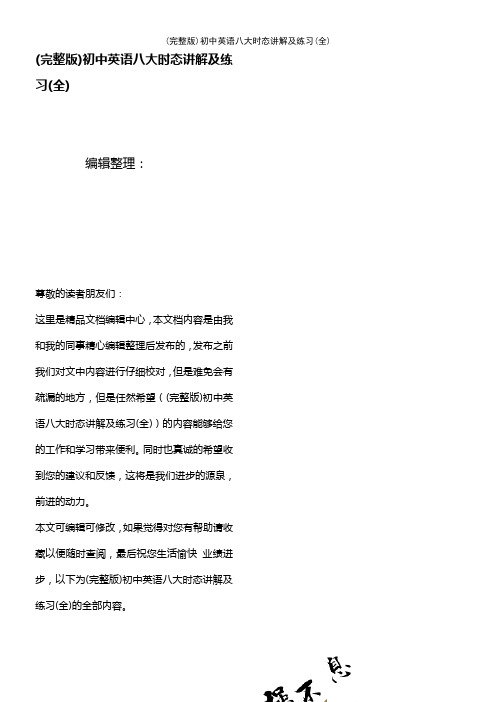
(完整版)初中英语八大时态讲解及练习(全)编辑整理:尊敬的读者朋友们:这里是精品文档编辑中心,本文档内容是由我和我的同事精心编辑整理后发布的,发布之前我们对文中内容进行仔细校对,但是难免会有疏漏的地方,但是任然希望((完整版)初中英语八大时态讲解及练习(全))的内容能够给您的工作和学习带来便利。
同时也真诚的希望收到您的建议和反馈,这将是我们进步的源泉,前进的动力。
本文可编辑可修改,如果觉得对您有帮助请收藏以便随时查阅,最后祝您生活愉快业绩进步,以下为(完整版)初中英语八大时态讲解及练习(全)的全部内容。
(完整版)初中英语八大时态讲解(全)〉这篇文档的全部内容。
及练习(全)编辑整理:张嬗雒老师尊敬的读者朋友们:这里是精品文档编辑中心,本文档内容是由我和我的同事精心编辑整理后发布到文库,发布之前我们对文中内容进行仔细校对,但是难免会有疏漏的地方,但是我们任然希望 (完整版)初中英语八大时态讲解及练习(全) 这篇文档能够给您的工作和学习带来便利。
同时我们也真诚的希望收到您的建议和反馈到下面的留言区,这将是我们进步的源泉,前进的动力.本文可编辑可修改,如果觉得对您有帮助请下载收藏以便随时查阅,最后祝您生活愉快业绩进步,以下为〈(完整版)初中英语八大时态讲解及练习一、一般现在时:概念:经常、反复发生的动作或行为及现在的某种状况。
时间状语:always, usually, often, sometimes, every week (day,year, month…), once a week, on Sundays, etc.基本结构:①be动词;②行为动词否定形式:①am/is/are+not;②此时态的谓语动词若为行为动词,则在其前加don’t,如主语为第三人称单数,则用doesn't,同时还原行为动词。
一般疑问句:①把be动词放于句首;②用助动词do提问,如主语为第三人称单数,则用does,同时,还原行为动词。
初中英语八大时态讲解及练习(全)
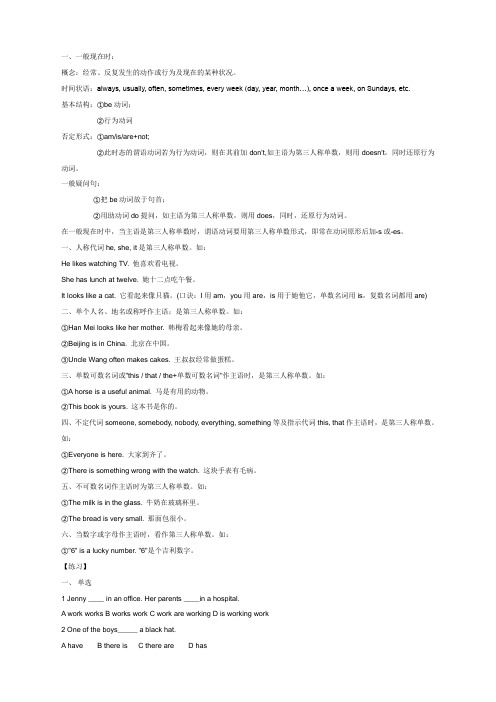
一、一般现在时:概念:经常、反复发生的动作或行为及现在的某种状况。
时间状语:always, usually, often, sometimes, every week (day, year, month…), once a week, on Sundays, etc.基本结构:①be动词;②行为动词否定形式:①am/is/are+not;②此时态的谓语动词若为行为动词,则在其前加don't,如主语为第三人称单数,则用doesn't,同时还原行为动词。
一般疑问句:①把be动词放于句首;②用助动词do提问,如主语为第三人称单数,则用does,同时,还原行为动词。
在一般现在时中,当主语是第三人称单数时,谓语动词要用第三人称单数形式,即常在动词原形后加-s或-es。
一、人称代词he, she, it是第三人称单数。
如:He likes watching TV. 他喜欢看电视。
She has lunch at twelve. 她十二点吃午餐。
It looks like a cat. 它看起来像只猫。
(口诀:I用am,you用are,is用于她他它,单数名词用is,复数名词都用are) 二、单个人名、地名或称呼作主语;是第三人称单数。
如:①Han Mei looks like her mother. 韩梅看起来像她的母亲。
②Beijing is in China. 北京在中国。
③Uncle Wang often makes cakes. 王叔叔经常做蛋糕。
三、单数可数名词或"this / that / the+单数可数名词"作主语时,是第三人称单数。
如:①A horse is a useful animal. 马是有用的动物。
②This book is yours. 这本书是你的。
四、不定代词someone, somebody, nobody, everything, something等及指示代词this, that作主语时,是第三人称单数。
- 1、下载文档前请自行甄别文档内容的完整性,平台不提供额外的编辑、内容补充、找答案等附加服务。
- 2、"仅部分预览"的文档,不可在线预览部分如存在完整性等问题,可反馈申请退款(可完整预览的文档不适用该条件!)。
- 3、如文档侵犯您的权益,请联系客服反馈,我们会尽快为您处理(人工客服工作时间:9:00-18:30)。
八大时态简易练习时态练习用动词be的适当形式填空1)My name _____ Peter. I _____ from America. I _____ afraid of speaking inpublic.2)Where _____ Lily and Mary? _____ they in the reading room now?3)I ____ very afraid at that time. But the boys _____ very brave.4)What _____ is in your bag? _____ there some money in it?5)Look, who ____ there? _____ there someone in Mary’s house?用动词 have或 there be的适当形式填空1)Everyone _____ their parents.2)Look, _____some boys playing football on the playground.3)_____ you any brother? How many people _____ in your family?4)“_____ any bread on the table now?” “No, _____. But _____ some eggs on it. 5)“How much money _____ in that bag? Have a look.” “Well _____ only six dollars.”A一般时态用所给动词的一般现在时填空1)Tim _____ (go) to work every morning. He _____ (work) very hard.2)The sun always _____ (rise) in the east.3)_____ you often _____(water) these flowers?4)We know that light _____ (travel) very fast.5)Sometimes he _____ (be ) right. But sometimes he _____ (make)mistakes.6)Dr. Lee usually _____ (visit) this museum once a month.7)Tom _____ (speak) Russian very well.8)If I _____( be) free tomorrow, I’ll go to see Mary.9)I’ll tell you about her as soon as class _____ (be) over.10)The train _____( leave) for Shanghai at 7 o’clock.11)_____ Li Ming’s m other _____(have) breakfast at home?12)He _____ (not speak) Japanese.用所给动词的一般过去时填空。
1.)Tom _____ (watch)TV at home last night. He _____ (go) nowhere.2.)When I _____ (be) young, I often _____(play) football.3.)He _____ (be) not with me at that time.4.)She _____(give) Mary a present last Christmas.5.)It _____(happen) ten minutes ago.6.)What time _____you _____(get up) yesterday morning?7.)Yesterday, I _____(be) an hour late and I _____(not get) to work until 9 o’clock.8.)They _____(be) in Beijing in 1995.9.)He ______(see) them off at the station last night.10) It _____(stop) raining and the sun _____(begin) to shine.A. 用所给动词的一般将来时填空1) I won’t ____(be) free tomorrow.2) The students _____ (have) a meeting this weekend.3) Lily _____ (stay) with me together.4) It’s going to _____(rain) this evening.5) We are going to _____(visit) the Summer Palace next Monday.6) She is going to _____(help) Tim again on Sunday.B. 用“Be going to”结构替换下列句中的 shall ,will(表示打算做某事或说话人认定会发生什么事)1) I shall visit him on Sunday.2) Will Mary and Tom play with us?3) Her mother will buy her a dress for her birthday.4) How will you do it?5) Won’t you have one of the cakes?6)You’ll not study French.53.用所给动词的过去将来时填空1) He told me that he ________(go) to Shanghai next Tuesday.2) He said there _________ (be) a film that evening.3) Ms Lee hoped her son _________ (come) to see her very soon.4) We asked them what _________ (happen) next.5) That woman bodyguard told us she __________ (let) us in if we could show her the passes.6) He wanted to know when you _________(visit) the zoo with him.54. 用所给动词的现在进行时填空。
1) The students __________ (read) English in the classroom now.2) “What are you doing here?” “I __________ (wait) for Tom.”3) Those students _________ (work) in a factory these days.4) More and more American people _________ (give) up smoking.5) Ms Lee _________(come) to see us tomorrow. And she _________(leave) for Beijing the day after tomorrow.6) The Whites _________(go) to the concert this coming Saturday.55.A. 用所给动词的过去进行时填空。
1) He _________ (do) his homework at two o’clock yesterday afternoon.2) They _________(have) a meeting from 8 to 10 last night.3) Mary _________( watch) TV when we came in.4) I _________ (wash) my clothes this time yesterday.5) At that time the boy ________ (play) football.6) While we _________ (talk) with Mr. Wang in English, a foreigner came up.B. 用所给动词的一般过去时或过去进行时填空。
1)When she was in Beijing, she often _______(take) a walk in the morning.2) He _________ (go) to leave for Shanghai when he got the letter.3) _____ you _____(have) breakfast this morning?4) Some of the students ________ (sing)and some_____(talk) when theteacher_____(come)in.5) Mary _________(do) her lessons while her brothers ________ (play) games.6) Where ______(be) you this time yesterday?7) _____ (be) there any schools in this village before liberation?8) The villagers ______(build) a new school for their children last year. They_______(build) it when we were there last summer.9) We ________(have) a meeting from 8 to 10 yesterday morning.10) The rain _____ (come) while we ________ (watch) the football match.56.A. 用所给动词的现在完成时态填空1) He _______(go) to see Ms Lee and he’ll be back in two hours.2) Great changes ________(take) place in my hometown since 1996.3) Ms Black _________(teach) maths for 21 years.4) He ________(be) to Paris five times.5) He joined the army when he was 18. He ________(be) an army man many years.6) I don’t want to see the film because I ________(see) it. I saw it last Monday.B.用所给动词的现在完成时或一般过去时填空1)The room is cold. Who ________ (open) the window?2) “Where is Tom?” “He ________(go) to the cinema.”3) _____ you _____(put) away my dictionary? I can’t find it anywhere here.4) I _____(read) the novel last year.5) My friend ______(live) in Beijing for ten years. He _____ (come) here in 1988.6) I _____(know) her since she came here.7) We ______ (not finish) the work yet.8) She _____ (study) English since 1980.9) My aunt _____ just _____(buy) a new coat. She _____(buy) it in Shanghai.10) I’m sorry, I _____(forget) your name.11) Tom _____(not find) his watch yet.12) I _____(see) the play. I _____(see) it last month with my sister.13) They ______(go) to Europe last year.14) I am not hungry; I _____ just_____ (have) my dinner.15) My father ______(be) to America many times.57.A. 用所给动词的过去完成时填空1)He told me he ______(meet) her before.2) She thanked me for what I ______(do) for her son.3) I ______ (learn) 300 English words by the end of last month.4) He ______ (leave) his office when I arrived there.5) She ______(visit) the city three times before she died in 1997.6) They knew she ______(borrow) a lot of money for her daughter.B. 用所给动词的一般过去时,现在完成时或过去完成时填空1)He said he _____(be) sorry he _____(forget) my name.2) Mary came to see me after I ____(telephone) her three times.3) We _____(be) glad that we _____(get)to the top of the hill.4) She said she _____(meet) me once two years before.5) I’m too late. The bus _____(go)6) I met Tom last Sunday. We _______(not see) each other for a long time.7) He thanked me for what I _____(do)8) How could you hear if you _______(not listen)?9) The ship _____(leave) for Japan yesterday.10) The students _____(do) their homework by the time the class ____(begin).11). Li Hong _____(learn) some English before he _____(come) to Beijing.12.) After he _____(drink) some tea, he _____(write) the letter.13). _____ you ever ____(be) to Hangzhou?Yes, I have. I _____(go)there a month ago.14) My aunt gave me a hat and I _____(lose) it.58. 选择填空1) He _____ for two year.A. has diedB. diedC. is diedD. has been dead2) One morning while I _____ along the street, I _____ an old man crying.A. walking, heardB. walked, heardC. was walking, was hearingD. was walking, heard3) Mr. Lee _____ Beijing for six days.A. has come toB. has reachedC. has got toD. has been in4)Tim _____ the army for three years.A. has joinedB. has taken part inC. has attendedD. has been in5) The stranger told us his name after we _____ him twice.A. askedB. have askedC. were askingD. had asked6) Ms Smith _____ in New York in the spring of 1997.A. has beenB. had beenC. wasD. were7) Don’t worry. The train _____ yet.A. arrivedB. won’tC. has arrivedD. hasn’t arrived8) The Whites _____ Paris and will stay there for one year.A. have gone toB. has gone toC. have been toD. has been to9) No one knew why Miss Black _____ the new boxes.A. has brokenB. had brokenC. would have brokenD. have broken10) She has just decided that she _____ the job.A. will takeB. is takingC. has takenD. would taken11) I’ll never forget what you _____ for me.A. have just doneB. just didC. won’t doD. are just doing12) I believe she will always keep what you _____ her.A. have just givenB. just gaveC. won’t giveD. had given13) ____ you like something to eat or drink?A. DoB. AreC. WillD. Would14) “_____ you mind my opening the window?” “_____, Please open the window.A. Do, YesB. Will, No C Do, No D. Can, Yes15) Kate’s twenty. She _____some Chinese by the time she _____ ten.A. had learned, wasB. has learned, wasC. learned, wasD. had learned, had been16) Peter _____ here now. I guess he _____ to the lab.A. isn’t; has goneB. is, has goneC. isn’t; wentD. isn’t; has been17) “ How often _____ you write to your grandpa?” “I wrote to him about____”.A. do, once a monthB. did, once a monthC. could, once a monthD. did, a once month18) The farmers _____ happily when the news reporter arrived.A. were singingB. sangC. have sungD. have been singing。
